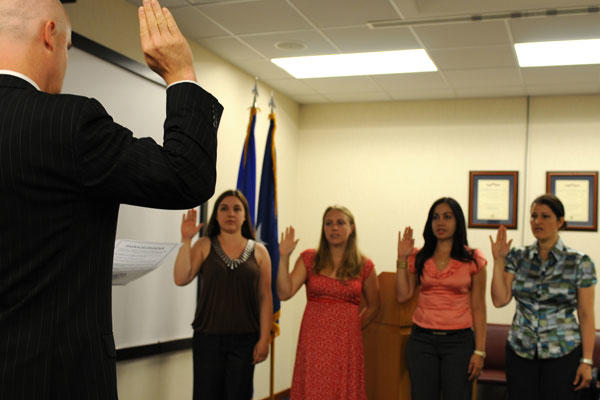Guidance released by immigration officials on Thursday means spouses or dependents of foreign-born U.S. troops will no longer be ordered out of the country when their service member becomes a U.S. citizen.
The U.S. Citizenship and Immigration Services field office directorate told agents that spouses and children of the newly minted Americans are not required to leave the country for two years before applying to return to the U.S.
Immigration attorney Margaret Stock of Alaska called the decision "a victory for military families."
"It's resolved. USCIS has reversed the new Obama administration policy that required them to leave," she told Military.com on Thursday. "This was the right thing to do. The new policy made no sense."
Stock said in November the White House directed USCIS to halt procedures intended to send service members' dependents back to their home countries. But Thursday's memo, a copy of which Stock provided to Military.com, was the first official word to the field offices.
Late last year, USCIS offices around the country were told that once foreign-born service members who entered the military under a special program became U.S. citizens, their immigration status changed and with it the status of their dependents.
Stock said many faced years of separation when USCIS ordered the dependents to return to their home countries for two years, and then reapply for entry to the U.S. Since the average time to act on such an application is 18 months, Stock said these families were actually looking at more than three years of separation.
With this latest reversal, Stock said the families "can adjust their status [as legal residents] here and obtain their green cards without going to a foreign country for two years first."
Those affected are mostly Army personnel, since they made up the majority of foreign nationals who enlisted under the Military Accessions Vital to the National Interest program, or MAVNI. Stock, a retired lieutenant colonel, designed the program and successfully pitched it to the Pentagon in 2008.
Most of those who came in under MAVNI have been doctors, who enter as enlisted soldiers -- E-4s -- and are then commissioned, mostly in the Army Reserve. Away from their active-duty commitment, many work full-time at Department of Veterans Affairs hospitals, she said.
The program, which had also recruited some individuals with critical language skills, was ended briefly last year, but is set to resume again in 2015.
Until the administration reinterpreted the legal status of dependents late last year, the families automatically were given legal residency after the service member became a U.S. citizen.
Last month, two local offices of USCIS ruled in favor of families who requested permanent residency, but a ruling against would have forced the family members out of the U.S.
In the USCIS memo sent out on Thursday, the directorate said any cases now being considered should be resolved under the current guidance, enabling the residents to stay in the U.S.
-- Bryant Jordan can be reached at bryant.jordan@military.com.



























